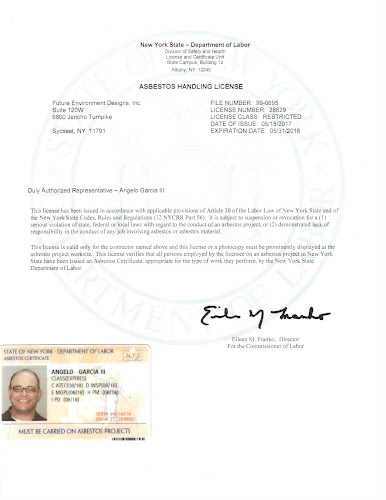New York State Department of Labor (NYSDOL) as of July 31, 2021, is requiring current asbestos and mold hard cards for asbestos and mold projects. Their latest automatic response email claims to be turning around asbestos hard cards in five (5) weeks and licenses in three (3) weeks. That same NYSDOL email says they are turning around mold licenses in three (3) weeks. So it seems the NYSDOL's license and certification unit is back to normal. On the other hand, the New York City Department of Environmental Protection (NYCDEP) is allowing workers whose hard card expired on March 15, 2020, or later to continue to work using their existing card until August 31, 2021. See NYCDEP's Extension of Asbestos Certification Deadline website for more information. In addition, NYCDEP has reinstated the examinations for asbestos as of April 21, 2021.
 |
| Asbestos Company License and Worker (hard card) Certificate |
In our blogpost in February 2021, we discussed that NYSDOL's Engineering Services Unit (ESU) came out with 10 Fast Track Variances and that this was a pilot program. On Thursday, July 22, 2021, the Professional Abatement Contractors of New York (PACNY) were notified by NYSDOL's ESU that they were shutting down the Fast Track Variance Program. The following is quoted from the NYSDOL email to PACNY:
"As the results of an increasing number of questions concerning relief granted by some Fast Track Variances (FTVs), ESU has decided to temporarily stop the FTV program. ESU will go back and review each FTV to ensure that the relief granted, and conditions listed in the FTV are consistent with ICR 56 and appliable Federal requirements. ESU will also try to better define when and how each FTV can be utilized. There seems to be some confusion about how some FTV’s are to be used. When ESU completes its review of an FTV, we will reissue that FTV for use moving forward. It is ESU’s hope that this review will not take long. In the meantime, site-specific variances should be applied for as usual via email to me and cc: Edward.Smith@labor.ny.gov"
So it seems if you want an FTV, you will have to apply and wait the time it takes to approve site-specific variances (anywhere from 3-6 weeks).
 |
| Asbestos Inspector Initial Class |












